Switzerland’s second team won the men’s class and Finland won the women’s class on the relay at the final day of the European Championships 2016 in Czech Republic. In the men’s class Norway and Czech Republic were closest to Switzerland – in the women’s class Sweden and Russia.
Both relays were very tight – with the lead changing many times during the relay. The stony and green parts of the Czech terrain proved tricky for many of the teams.
Men: Switzerland 2 again
Martin Hubmann won the European Championships relay with Switzerland 2 four years ago in Falun, Sweden – and repeated that feat this year in Czech Republic after a very strong last leg. Before the last leg favourite teams Switzerland 1 (mistakes by Daniel Hubmann on the 2nd leg) and Sweden 1 (mispunch on the second leg by Oskar Sjöberg) were out of the gold medal game. On the last leg a tight battle was fought between Czech Republic, Sweden 2, Norway and Switzerland 2.
These four teams were nearly together before the last forking at the 11th control – this was the decision point. Here Norway’s Magne Dæhlie and Czech Republic’s Vojtek Kral had a longer forking than the two other teams (A on the map below, maybe 30-40 seconds longer based on looking at all the teams) while Sweden 2’s Martin Regborn did a 30-40 second mistake (he had a tricky forking control, B, but it was possible to run it fast with good execution). At this point in the relay Martin Hubmann got the decisive gap (forking control A) – and although the other teams came closer towards the end, they never manage to get close enough. Hubmann was not even sure that he was the first finisher!
.@worldofo Last forking => #decisionpoint in #EOC2016 Relay. Here Martin Hubmann got decisive gap to CZE/NOR/SWE2 pic.twitter.com/Sti7jBekcy
— WorldofO.com (@worldofo) May 28, 2016
Women: Finland back on top!
The women’s relay also featured a lot of excitement. Russia was in the lead of the relay on the last leg when Svetlana Mironova orienteered to the wrong control in the middle of the last leg – but Mironova managed to fight Russia up to a bronze medal again despite this mistake. Norway lost the changes for a medal already early on the first leg after a sub-par routechoice on the long leg. Switzerland lost a lot of time on the second leg – and would have been out of the medal fight if not for a great race by Judith Wyder. Wyder was however a few meters too late for a medal in the end after a brave fight (even losing some time due to falling down a hill) and finished in 4th.
The fight for gold was eventually between Sweden’s Tove Alexandersson and Finland’s Merja Rantanen. Alexandersson is known as the strongest physically in women elite orienteering – but on this day Rantanen proved that she is faster in a finish spring. Rantanen found a lot of power, and brough Finland to gold! The Finnish women have not won a World Championships or European Championships relay since 2011 with Minna Kauppi on the team (the years before Finland won many titles). Minna Kauppi said after the 2011 victory; “– It was the same as it always is [in a WOC relay]. I do a big mistake, and then there is big drama”. This time Rantanen had taken Kauppi’s role – and there was still a lot of drama!
Medal table
Medal table #eoc2016:
SUI 5-1-2= 8
SWE 2-3-1= 6
RUS 1-0-3= 4
FIN 1-0-1= 2
NOR 0-3-0= 3
DEN 0-1-1= 2
UKR 0-1-0= 1
CZE 0-0-1= 1
FRA 0-0-1= 1— EOC 2016 (@eoc2016) May 28, 2016
Maps & GPS-tracking
Relay Men 3

» See map in omaps.worldofo.com
Relay Men 2

» See map in omaps.worldofo.com
Relay Men 1

» See map in omaps.worldofo.com
Relay Women 3

» See map in omaps.worldofo.com
Relay Women 2

» See map in omaps.worldofo.com
Relay Women 1

» See map in omaps.worldofo.com
Results
Results Men
1. SUI 2 Switzerland 106.07
Howald Florian 35.54 (13) Rollier Baptiste 34.28 ( 2) Hubmann Martin 35.45 ( 1)
2. NOR 1 Norway 106.15
Kaas Carl Godager 35.23 ( 6) Kinneberg Eskil 34.40 ( 3) Dahli Magne 36.12 ( 2)
3. CZE 1 Czech Republic 106.20
Petržela Jan 34.20 ( 1) Šedivý Jan 34.54 ( 4) Král Vojtech 37.06 ( 8)
4. SWE 2 Sweden 107.09
Leandersson Jonas 35.37 ( 8) Runesson Johan 33.36 ( 1) Regborn Martin 37.56 ( 9)
5. SUI 1 Switzerland 107.52
Kyburz Andreas 34.20 ( 1) Hubmann Daniel 37.09 (13) Kyburz Matthias 36.23 ( 3)
6. RUS 1 Russian Federation 108.01
Khramov Andrey 35.08 ( 5) Tcvetkov Dmitrii 36.26 ( 9) Novikov Valentin 36.27 ( 4)
7. CZE 2 Czech Republic 109.00
Nykodým Miloš 36.08 (19) Kubát Pavel 36.22 ( 8) Procházka Jan 36.30 ( 5)
8. AUT 1 Austria 111.02
Gremmel Helmut 38.21 (25) Kerschbaumer Gernot 35.36 ( 7) Merl Robert 37.05 ( 7)
9. FIN 2 Finland 111.07
Taivainen Olli-Mark 35.56 (14) Ojanaho Olli 38.31 (18) Sirén Mikko 36.40 ( 6)
10. LAT 1 Latvia 111.15
Paulinš Arturs 35.59 (16) Sirmais Martinš 36.41 (11) Bertuks Edgars 38.35 (11)
Results Women
1. FIN 1 Finland 102.57
Anttonen Sari 34.06 ( 5) Teini Marika 34.44 ( 8) Rantanen Merja 34.07 ( 1)
2. SWE 1 Sweden 103.01
Strand Lina 33.45 ( 4) Johansson Emma 34.01 ( 4) Alexandersson Tove 35.15 ( 4)
3. RUS 1 Russian Federation 103.12
Rudnaia Anastasiia 33.15 ( 2) Vinogradova Natalia 33.24 ( 1) Mironova Svetlana 36.33 ( 6)
4. SUI 1 Switzerland 103.18
Gross Julia 33.14 ( 1) Hauswirth Sabine 35.40 (10) Wyder Judith 34.24 ( 2)
5. RUS 2 Russian Federation 103.26
Novikova Yulia 33.26 ( 3) Vinogradova Galina 34.30 ( 7) Efimova Natalia 35.30 ( 5)
6. FIN 2 Finland 103.55
Haajanen Sofia 34.39 ( 9) Kinni Saila 34.20 ( 5) Harju Venla 34.56 ( 3)
7. SWE 2 Sweden 107.14
Forsgren Lilian 35.09 (11) Bachman Anna 33.53 ( 2) Olsson Alva 38.12 ( 7)
8. CZE 1 Czech Republic 107.44
Kosová Denisa 34.10 ( 6) Šafka Brožková Dana 34.28 ( 6) Knapová Jana 39.06 (10)
9. DEN 1 Denmark 109.31
Klinting Signe 35.19 (14) Bobach Ida 33.59 ( 3) Alm Maja 40.13 (13)
10. NOR 2 Norway 110.27
Myhre Ingjerd 34.35 ( 8) Andersen Marianne 37.26 (15) Johansson Emma 38.26 ( 9)
 World of O News
World of O News
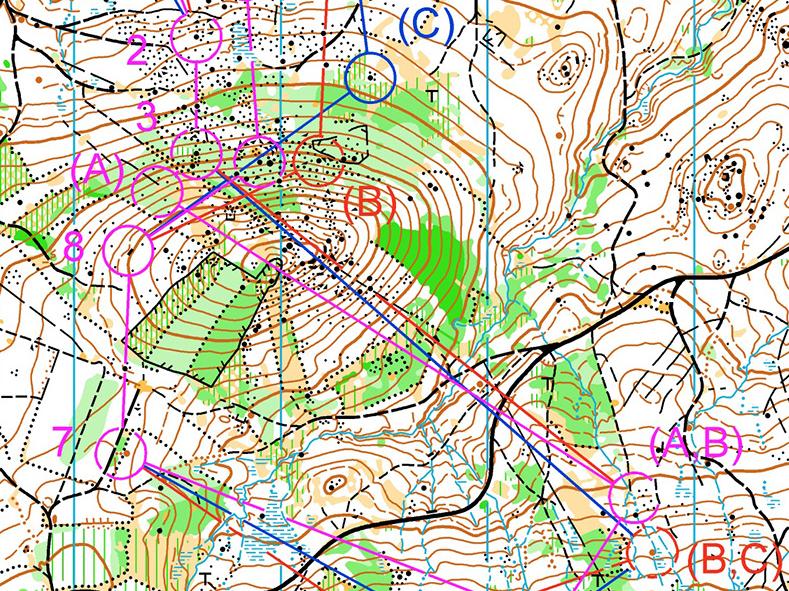
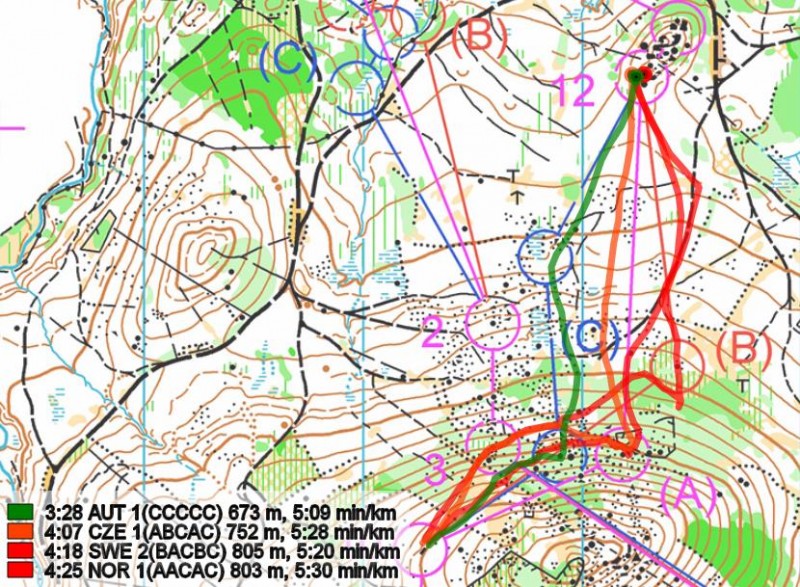
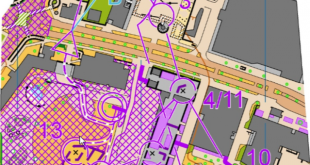
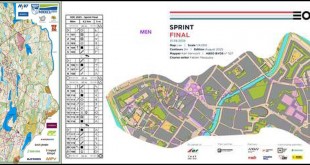
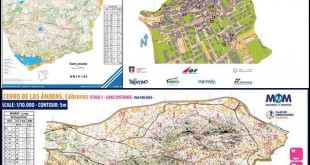
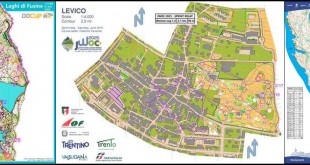
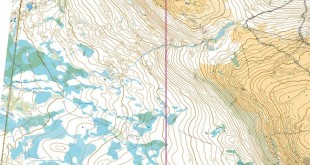
This was exactly the same championship relay problem which we started to discuss in 2010:
The relay forking must not give any kind significant time difference late in the last leg!
When there is such a forking difference, the team(s) that have the longer alternatives early in the relay will have a huge advantage, since they can use the group running to catch up to the lead during the initial legs and then use the short forking to get a decisive advantage at the end.
The IOF Senior Event Advisor (SEA) should never have allowed a 30+ second difference between the forkings!
The fact that Martin Hubmann in this case got great helped from a disqualified team, Sweden 1, Gustav Bergman, both to find his short forking controls fast and to keep a good pace all the way to the arena passage surely helped him to secure the gold for Switzerland. Perhaps, or even probably, the chasing teams would have caught him up before the second last control if he had been alone. A sprint finish between Martin Hubmann and Magne Dæhli for the gold would have been exciting!